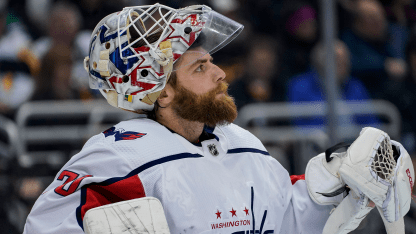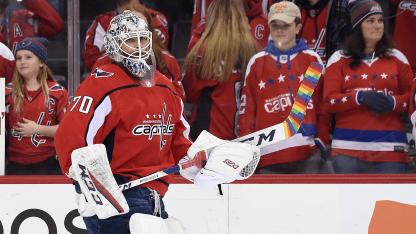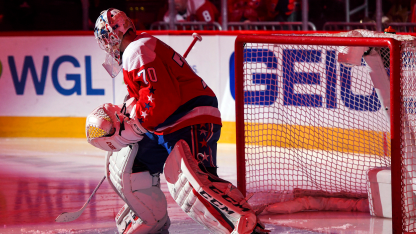It's been a dozen years now since the Caps exercised a fourth-round pick in the 2008 NHL Draft on Braden Holtby, a goaltender from Lloydminster, a town of around 30,000 inhabitants that straddles the border of Alberta and Saskatchewan. Holtby grew up in an even smaller nearby town, Marshall, Sask., a hamlet of 533 people where his family has a farm.
Holtby Expresses Support
Caps goaltender vows to be a voice for change in ongoing push for equal rights for all

By
Mike Vogel
WashingtonCaps.com
Holtby's first experience with the D.C. area came in the summer of 2008, when he attended his first summer development camp as an 18-year-old who still had junior hockey ahead of him with the Saskatoon Blades. Even at that age, there was something different and refreshing about Holtby. He had an open mind and an open heart, he always listened carefully to reporters' questions, made a point of making eye contact with the questioner, and he routinely paused for a beat to consider before delivering his reply.
Once he arrived here in Washington on a full-time basis, other differences stood out. He often brought a guitar with him on road trips, and he later kept one at the Caps' practice facilities to play after practices and morning skates. Holtby had a voracious appetite for books and music, and is always active in seeking out new voices, new authors, fresh viewpoints. Most players sleep, play cards or watch movies on the team's flights from one city to another. Holtby almost always had a book with him; he preferred to read on the plane.
Braden Holtby | June 5
Hockey players are drafted as teenagers, and only a quarter to a third of them ever make it to the NHL. Rarer still are the few that are drafted by a team and are still with that organization a dozen years later, and the Capitals have the privilege of having a quartet of those players on their roster right now: Alex Ovechkin, Nicklas Backstrom, John Carlson and Holtby.
Caps fans have seen these players grow from boys to men, get married, start families. In this age of social media, fans have a wider glimpse into the personal lives of players, as much as those players permit them to see. Holtby leans far toward the quieter side in that regard; he doesn't use social media much at all.
But he has never been shy about using his voice or his platform for the greater good.
Throughout his time in D.C., Holtby and his wife Brandi have strongly advocated for human rights and for the rights of the LGBTQ community, annually marching in the D.C. Pride Parade. He was also a featured speaker at the Human Rights Campaign's national dinner in September of 2018.
When the Caps won the Stanley Cup in 2018 and were subsequently invited to the White House, Holtby - along with then-teammates Brett Connolly and Devante Smith-Pelly - decided not to accept the invitation.
"My family and myself," Holtby told Isabelle Khurshudyan of The Washington Postin March of 2019, "we believe in a world where humans are treated with respect regardless of your stature, what you're born into. You're asked to choose what side you're on, and I think it's pretty clear what side I'm on. I believe that this is the right decision for myself and my family."

Holtby didn't seek any fanfare for his decision, it was just something his moral compass compelled him to do. Although not a frequent denizen of social media, Holtby is well aware of what is going on in the world around him.
"I'm not very active on the social media scene or anything," says Holtby, "but I've just been following along with the news and such and what's been going on with the country. It's something I've been passionate about for a while, just trying to educate myself and learn as much as I can to not be so naive, especially as a kid growing up in a small town in Canada where - the situations that are developing today - I never dealt with."
In the volatile aftermath of the tragic murder of George Floyd at the hands of the Minneapolis Police Department on May 25, numerous protests are being staged nightly across the country and the nation's attention has dramatically and abruptly shifted from the ongoing coronavirus pandemic to police brutality and the plight of African Americans and other minorities in the U.S.
"I wanted to educate myself," says Holtby. "Every day I was kind of getting more and more depressed, upset and angry. And I knew Brandi was trying to do her part. I just felt I needed to say something. You know, if it helps someone out somewhere, I just felt like I needed to (say something) in order to do my part. It's not just one thing, it's one of those things we tried to pride ourselves. It's not a 'flavor of the week' type thing; it's something we live our lives around, and just trying to do our part."
There is an urgent need for conversation and action, and an urgent need for justice and basic human rights for all. There are those who are merely averting their eyes from the problems, merrily posting their memes and willfully ignoring the ongoing and festering turmoil all around them - perhaps because it doesn't affect them directly - but Holtby is not one of them.
"A lot of the reason that I don't go on social media too often is I think it's flooded with people saying things before thinking, before truly believing in the words that they said," says Holtby. "I've been thinking about what to say for over a week and trying for it to resonate to the black community of what I believe the white community should take responsibility for.
"I don't think this time is a time to sugarcoat anything. I think it's a time to look at ourselves in the mirror and really find how we can be better and how we can take responsibility for the past and learn from that to move forward. Moving to this area from Canada, I think the biggest thing for me is that with the Caps, we get to do a lot of work in the community. And seeing some of the areas in the city that I've never seen before and seeing how behind the eight-ball so many people are to start with, I think that's hit me since I first got here and it's one of those things - I'm just trying to learn how I can do my part and my family's part to help people out. I'm really hoping - I really believe this is going to change the world in a lot of ways."
When he composed his thoughts and words on the matter, he crafted them into his first Twitter post in more than three years, with a three-sentence lead-in followed by a hashtag:
"I couldn't find the words to say. And still haven't. But I had to try. #BlackLivesMatter"
I stare at the Woodrow Wilson Bridge, spanning across the Potomac River. From Virginia it leads to Maryland, into Prince George's County. One of the most affluent Black counties in America. And here a monstrous bridge stands, named after a racist president. A President who was an outspoken white supremacist. Who segregated federal workers based on race. The bridge sits there mocking every black person who has to travel across it while reading that name as a reminder of how much pain has been inflicted on their race. And yet, the society that has inflicted that pain seems proud of it. Proud enough to name a bridge in a white supremacists honor.
The injustice and hatred infused power we've seen recently is anything but new. To say there have been improvements is very naïve. In today's age of information and communication at our fingertips the change is far too minimal. The amount of inhumane, hate based, racial crimes that have been committed in the centuries of American history is enough to make your skin crawl in discomfort and your eyes well with tears. Yet it's still happening. In 2020. It should never happen. Yet … it still is.
So now what? Where do we go from here. As a person who definitely falls into the white privileged category, I know I will truly never know what it's like to walk in a black man's shoes. But I know I have arms, and ears, and a voice to walk beside and listen to every word of anguish and give my strength to every black man, woman or child until their shoes weigh the same as mine.
For everyone standing up and marching for what is right, your voices are not going unheard. You're bringing pride to every person who believes in the universal value of a human being. Keep fighting, and I vow to demonstrate and educate what you are fighting for. Not only to myself but to my children, family, and anyone else who will listen. Because America will never be great until all lives matter.
Tweet from @Holts170: I couldn���t find the words to say. And still haven���t. But I had to try. #BlackLivesMattter pic.twitter.com/skd8Zfs6ff
As you would imagine, most of the response to that heartfelt missive were positive. Most people don't want to see others suffer, and most people are advocates for equal rights for all. But when racism has been ingrained into a country and a society over a period of 401 years, it is a systemic problem, woven deeply into the very fabric of the nation and its institutions.
There will always be those people who will try to slow the glacial progress that has been made to date by muddying the waters. They're the ones dismissing Holtby's statement because he is Canadian or because they believe athletes should be limited to performing and entertaining, that the only words we need to hear from them are a few well-uttered clichés in the aftermath of the latest win or loss. They're trying hard to hold onto their status quo, and as the world around them changes and passes them by, their comments reek of desperation and willful obstinance and ignorance.
But Holtby won't be deterred by the "stick to your job" or the "but you're Canadian" factions.
"Those are two you hear a lot," he says. "The part about just being hockey players, we all have our professions, everyone does. Unless your job is to fight racial inequalities or any sort of social issues that way, we're all just trying to be humans, and we just happen to have a following based on our job, where it's easier for people to see us.
"It's crazy to think that that is an argument. We play hockey on the ice, we live our lives just as humans off of the ice and try to do our part that way. And about the Canadian thing, I've lived here for over 10 years now, so I call this home. It's my kids' home; my kids are both American. So I feel like I'm fortunate to have been in both countries and a part of both countries.
"Canada follows America in a lot of ways. If you go from Canada to America, you don't see a ton of difference. The northern part of the States are very similar to Canada. And I believe when you try to make changes in one, they change in the other. Being Canadian, I obviously went to school in Canada, did all my schooling on Canadian history. So American history is one of those things that I don't have much schooling on, but I have a huge passion for it. I think it's extremely interesting in so many different ways, and I enjoy learning about it and seeing what is good and what is bad, what should change and the future should look like in my mind, and that's all I'm trying to preach."

It's a start. Holtby can't do much by himself, but if he is able to use his platform to spur others into action or into educating themselves, he knows he can be a positive force to keep the momentum rolling forward. It's what we all should be doing in whatever ways we can; we are all responsible and accountable for actively trying to make our world and our communities as good as they can be, and for making the world better than it was when we arrived.
"To kind of expand on educating yourself," says Holtby, "I think that just goes along with bettering yourself, bettering people around you. Growing as a human, that's the way you are going to grow as a group and as a sport. And I think as long as we realize we do have a platform, our responsibility now is to make sure we are getting the message across that we believe in, that we want our children to grow up in.
"The world needs change, and obviously we are just hockey players. A lot of us have skipped education in a lot of ways to become hockey players. So we are all kind of behind the eight-ball already that way. But in today's world, [with] how much is out there, how much you can learn, if we really focus in on the right areas and listen - because you can never know what it's truly like to be a different person, but you can learn and try to preach the right message. I mean, who knows what the right thing is, but I believe if you're educating, growing, and most importantly teaching the youth the right way to treat people, that's where change comes from."


















